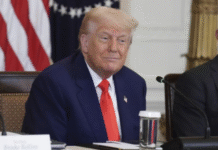London–In a narrow but stunning reversal of what was widely expected, Britain on Friday decided to exit the European Union (EU), rattling global financial markets. Prime Minister David Cameron, who had strongly backed the “Remain” vote, said he was quitting.

The pound sterling fell to its lowest level against the US dollar since 1985 — and the euro took a hit too — as the result of Thursday’s historic referendum that ended Britain’s 43-year association with the EU started coming.
England and Wales voted strongly to exit while London, Scotland and Northern Ireland backed the “Remain” vote. UK Independence Party leader Nigel Farage, who had been campaigning for 20 long years to dump the EU, called the Friday result UK’s “Independence Day”.
The result was a narrow affair: 51.9 per cent vote for Brexit against 48.1 per cent vote for ‘Remain’.
A grim looking Cameron admitted he had lost the battle and would step down by October.
“The British people have decided to follow another path. So they need a new prime minister,” he said in a televised statement outside 10 Downing Street, the prime minister’s official residence.
He said he would do everything to “steady the ship” in the coming months and that the country should aim to have a new Prime Minister by the start of the Conservative Party conference in October.
Farage told cheering supporters that “this will be a victory for ordinary people, for decent people”.
Britain will be the first country to leave the 28-member EU but this does not mean that it will immediately cease to be member of the grouping.
The process could take as much as two years, experts said.
Those advocating Britain’s exit from the EU argued during four bitter months of the campaign that it was high time the country took control of its own affairs.
Thursday’s turnout in the referendum was 71.8 percent — the highest in a UK-wide vote since 1992. Over 30 million people voted.
The pound dropped 11 per cent to its lowest level in over three decades on Friday, wiping out earlier confidence from exit polls that suggested the ‘Remain’ camp would prevail, the Financial Times reported.
The euro, seen to be vulnerable if Britain voted to leave the EU, was also down 3.2 per cent against the US dollar, which rose strongly against emerging market currencies.
A stunning slide in sterling at 3.40 a.m. saw the currency plummet below $1.40, and 20 minutes later it had breached $1.35 to levels last seen in 1985. An hour later, the pound touched a new low at $1.3224.
The UK vote spurred similar calls to exit the EU.
Dutch Freedom Party leader Geert Wilders said it was the time for a referendum in the Netherlands. “Hurrah for the British! Time for a Dutch referendum!” he tweeted.
Marine Le Pen, the leader of France’s far-right Front National Party, also sought a similar referendum in France. “From #Brexit to #Frexit: It’s now time to import democracy to our country. The French must have the right to choose!” she tweeted.
Manfred Weber, leader of the largest group in the European Parliament, the EPP, said exit negotiations should end within two years. “There cannot be any special treatment. Leave means leave.”
German Foreign Minister Frank-Walter Steinmeier called it a sad day for Britain and for the EU.
Gerard Araud, the French ambassador in Washington, warned that other EU members must save it from unravelling. “Reform or die!”
The vote rattled Indian financial markets too, shaving over 1,000 points, or 4 per cent, off a key equities index, while pulling the rupee just below the 68 mark to the dollar.
Both Finance Minister Arun Jaitley and Reserve Bank of India Governor Raghuram Rajan sought to calm the markets and said there was no cause for panic as India’s economic fundamentals remained strong and along with other macro indicators.
“We are well prepared to deal with the short and medium term Brexit consequence — strongly committed to our macro-economic framework with focus on stability,” Jaitley tweeted from Beijing.
Rajan said investors need not panic over the rupee. “We are comfortable on foreign exchange reserves. We can use it when necessary.” (IANS)






